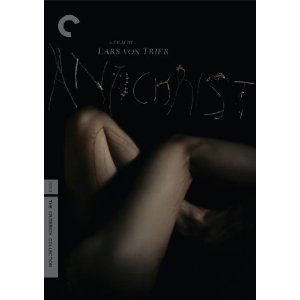Patriarchal Womanhood Twisted through Nietzsche in “Antichrist (The Criterion Collection)”
 Anthony Lane for the New Yorker reviews Lars von Trier, his “shocker” Antichrist in “Trouble in Eden.” Some guy on the Internet, writing for themenscenter.org, says, “The sad truth is that women make a whole lot more sense once you assume that women are deceitful and scheming.” The logic of the character, She, in Antichrist works like this: “nature is evil, women are controlled by nature, therefore women are evil.” What the almost-Nietzschean hero, He, attempts is to literally get her beyond good and evil—hey, just like that book title, Beyond Good and Evil, written by the same crazy dude that penned The Anti-Christ. Coincidence? By the way, these character names draw me toward Ferlenghetti, his poem “Her.”
Anthony Lane for the New Yorker reviews Lars von Trier, his “shocker” Antichrist in “Trouble in Eden.” Some guy on the Internet, writing for themenscenter.org, says, “The sad truth is that women make a whole lot more sense once you assume that women are deceitful and scheming.” The logic of the character, She, in Antichrist works like this: “nature is evil, women are controlled by nature, therefore women are evil.” What the almost-Nietzschean hero, He, attempts is to literally get her beyond good and evil—hey, just like that book title, Beyond Good and Evil, written by the same crazy dude that penned The Anti-Christ. Coincidence? By the way, these character names draw me toward Ferlenghetti, his poem “Her.”
My savage, pre-historical summary is this: you can take the woman out of the ghetto but you can’t take the ghetto out of the woman. And here the “ghetto” is the patriarchal concept of womanhood. Attempting to operate intellectually with the pretense of “universality” inside this ghetto can contribute to driving many brilliant people insane. Patriarchy is filled with solutions and psychological reaction formations to peculiar problems related to a distinct lack of natural resources (which can make nature “evil”—the snow makes you serious). These solutions and psyches become enshrined in tradition and then go too long unquestioned. Any woman or man who fails to question patriarchy and fails to see the ghetto in which she is oppressed could very well end up in a drama symbolized by Antichrist. Period.
